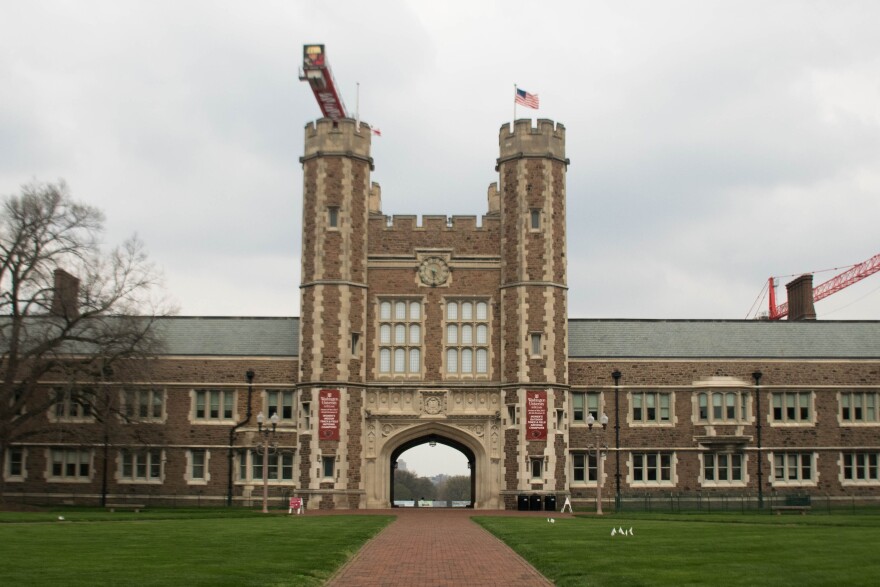Nearly a quarter of female undergraduates at Washington University in St. Louis experienced sexual assault after they entered the college, a 2015 estimate by a contracted research agency shows.
Student activists today say the administration has failed to protect people from sexual assault, and that they do not trust the school to investigate complaints.
Loading...
At a rally on Thursday at 4 p.m. on Wash U’s campus, speakers plan to demand more staff, funding, training and resources for students who experience assault or harassment.
The protests come less than one year after the Office of Civil Rights at the U.S. Department of Education opened three federal investigations to determine whether Wash U has complied with Title IX. The federal law requires that discrimination, including sexual violence, not prevent students from accessing education. Two of the investigations are of campus sexual assaults and a third involves allegations of sexual harassment.
The campus’s handling of sexual assault cases hasn’t impressed Bonnie Castleman, 19, a freshman from California who said she wanted to attend a college that handled sexual violence well. At first, she thought Wash U was that school.
“When you look on Wash U’s website there’s so much about sexual assault, there’s so much about the[Relationship and Sexual Violence Prevention] Center and the Title IX Office, that I had really hoped to see a school that really was dedicated to making change,” said Castleman, who’s now a member of a student group that educates other students about interpersonal violence. “I was pretty disappointed when I actually got here.”
Federal guidelines encourage universities to complete sexual assault investigations within 60 days. But at Wash U, such cases take seven to nine months, according to its Title IX Office.
The university struggles to complete investigations quickly, said Jessica Kennedy, director of Title IX Office. The current process is fair and thorough, she said, but her office has been working to make it faster.
And the university is open to making changes based on students’ critiques, said Kennedy.
“The process was designed with students’ input; it is designed to work for our students,” she said. “When it doesn’t do that, we want to know how we can do better and how we can change it to meet their needs.”
According to a demands document, students want more training for Wash U staff who interact with survivors, more financial investment in programs that support survivors and new hires to agencies that develop resources for students.
They want Wash U offices that investigate sexual assault to release to the public more information on case length and student punishments. They also want the university to form an oversight committee that can remove investigators who perform poorly and enforce students’ requests for learning and living accommodations. And they want to replace Kennedy.
The University Sexual Assault Investigation Board completed 39 investigations between January 2013 and the end of the 2017 school year. University officials found about half of those accused responsible. But the board only investigates cases when someone files a formal complaint against a student to allege sexual misconduct.
Loading...
But in 2015, analysis estimated that more than 1,000 students had experienced at least one sort of sexual assault since entering Wash U, according to a report based on a survey conducted by the research service company Westat.
The survey was sent to the more than 13,000 graduate and undergraduate students enrolled full-time that April; about 3,000 people responded. Westat developed the survey for the Association of American Universities’ Climate Survey on Sexual Assault and Sexual Misconduct and administered it at 26 other schools.
Analysis at Wash U indicated that about 22.6 percent of female undergraduates experienced sexual assault “by force or incapacitation.”
Male students reported similar experiences, and students of both sexes reported coercion rather than force. Students said the vast majority of assaults occurred during the academic year.
Of those who experienced sexual assault, 27.7 percent said they did not report because “they did not think anything would be done about it.”
After this report, the university changed some of its policies and increased staff to its sexual violence prevention programs. But Castleman said that the changes didn’t go far enough.
She thinks that when students hear about missteps in past cases, it decreases their trust in the school’s processes — and even discourages them from reporting crimes.
“I think we’re going to see reporting rates drop a lot,” she said.
Castleman said that the investigation board should be able to uphold due process and enforce standards of evidence, but still treat trauma survivors empathetically.
“I have several friends who’ve undergone the Title IX [investigation board] process, and even if they have won their cases, they still describe it as a traumatizing, upsetting, excessively long and invasive process that is just not catered towards survivors,” Castleman said.
The office already provides some training to staff and investigators, Kennedy said, but would consider increasing that training and introducing new curricula. The school has also hosted listening sessions to gather student feedback.
But she also said that the Title IX office has responsibilities to all students on both sides of sexual assault investigations. The office needs to maintain due process, provide resources to everyone involved, and give students equal opportunity to respond to the case.
Kennedy said that students’ requests for support measures can sometimes contradict her office’s obligation to accused students.
“That is the university’s responsibility, to try to achieve both [supporting the complainant and the respondent],” Kennedy said. “It may not be possible to achieve both of those goals — for any institution, not just ours.”
Follow Kae on Twitter: @kmaepetrin




